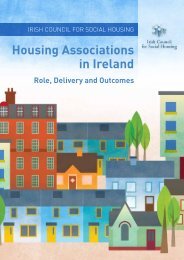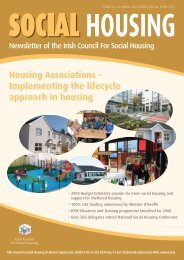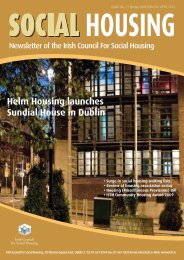National Housing Strategy for People with a Disability 2011 - 2016
National Housing Strategy for People with a Disability 2011 - 2016
National Housing Strategy for People with a Disability 2011 - 2016
Create successful ePaper yourself
Turn your PDF publications into a flip-book with our unique Google optimized e-Paper software.
fostering positive mental health across the entire community and <strong>for</strong> providing accessible,community-based, specialist services <strong>for</strong> people <strong>with</strong> mental health disabilities. The policyenvisions an active, flexible service where the need <strong>for</strong> hospital admission will be greatlyreduced. Underpinning A Vision <strong>for</strong> Change is the principle of recovery. This, in effect,means that it is possible <strong>for</strong> most service users to achieve greater control over their livesand, <strong>with</strong> the help of appropriate recovery oriented programmes, many could achieve a levelof functioning to enable them to live a more independent life in the community.9.15 A Vision <strong>for</strong> Change also recommends that “other agencies must take up theirresponsibilities in full so mental health services can use their funding <strong>for</strong> mental healthresponsibilities. Mental health should not provide the broad range of services which aremore appropriately provided elsewhere”. In this context, the policy considers that housing isa matter <strong>for</strong> local authorities <strong>with</strong> mental health services providing acute and continuingcare beds and high support community residences.9.16 Broadly speaking, those requiring accommodation supports can be considered tobelong to one of the following groups:• Service users who are long-term residents of institutional or high support communityresidences, who may, even <strong>with</strong> supports, be unable to make the transition toindependent living. This group will continue to be the responsibility of mental healthservices; however, the option to live independently should continue to be offered;• Many service users who have spent a long period or several lengthy periods ininpatient or long-stay accommodation may have the potential to either increase theirlevel of independence by transferring to group or individual settings <strong>with</strong> supports orlive independently; however, because of the pattern of their illness they may requireperiods of respite or indeed acute inpatient care. Key to the successful transition ofthis group to sustained independent living will be the quality and adequacy of thesupports provided to them;• The majority of the current and upcoming generation of long-term service users whohave little experience of inpatient care and who have not developed a dependencyon institutionalised care could, <strong>with</strong> appropriate peer advocacy support structures,live independently. These service users should be able to successfully accesshousing and maintain tenancies <strong>with</strong> the support of the range of services provided bythe community mental health teams, the standard tenancy support services providedthrough the local authority and other community and social supports that may berequired from time to time <strong>for</strong> successful independent living;105









